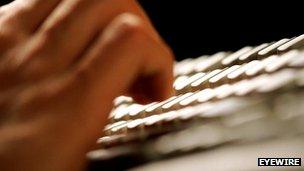Man admits hacking abortion provider BPAS's website
- Published

There were claims the names of women who had received terminations would be released
James Jeffery, 27, has been remanded in custody after admitting to breaking into the British Pregnancy Advisory Service website on Thursday.
Jeffery, from Wednesbury, West Midlands, appeared before Westminster Magistrates' Court on Saturday.
He claimed on Twitter that he had stolen nearly 10,000 database records detailing women registered on the site.
He told the court he acted because he "disagreed" with the choice of two women he knew to end their pregnancies.
Jeffery, who claims to be a member of hacking group Anonymous, will be sentenced at Southwark Crown Court at a later date.
'Able hacker'
Jeffery, of Castle Street, Wednesbury, West Midlands, showed no emotion as he appeared in the dock and admitted two offences under the Computer Misuse Act.
Deputy senior district judge Daphne Wickham called him a "zealot with an anti-abortion campaign".
She said she did not have sufficient powers to pass sentence and adjourned his case.
The judge also refused his application for bail, saying: "Many, many other organisations and people's private details would be at risk.
"You clearly are an able hacker. You will be remanded in custody."
The court had heard Jeffery had also identified "vulnerabilities" on a string of websites including those for the FBI, the CIA and the Houses of Parliament.
It also heard how he targeted a site used by victims of domestic violence who seek advice on how to deal with unwanted pregnancies.
The "vulnerabilities" of these individuals was "quite a concern" for the charity, prosecutors said.
'Taken very seriously'
Jeffery then intended to "release all the details" of those registered on the BPAS site.
He used Twitter, under the name Pablo Escobar, to prove he had accessed hundreds of user names and email addresses by printing the name and log-on details of a BPAS administrator.
He also managed to deface the website with the Anonymous logo and a statement.
Earlier, the court was told that Jeffery decided against publishing the details he had illegally obtained because he thought it was "wrong" to do so.
The judge said that those affected would still be concerned about how much of their private information had entered the public domain.
"All the people who have used the service ...they will all be concerned, these women, that their records or details have been released," she said.
Prosecutors told the court all of Jeffery's computers had been removed and there was no evidence to suggest he had lied about his "change of heart".
Jeffery's lawyer - Joseph Lawrence-Oyeyi - said his client should be given credit for pleading guilty at an early stage.
The court heard Jeffery, who has previous convictions for theft, cannabis cultivation and assault, had not been in any trouble for the past seven years.
Jeffery was arrested by officers from the Metropolitan Police's central e-Crime unit during the early hours of Friday, after the company contacted police to say it had been targeted.
The officers found his computer "in the process of being wiped clean" and seized a number of items including an iPad, iPhone, three lap-tops, a hard drive and note book.
BPAS believes its computer servers and website were targeted on 26,000 separate occasions over a six-hour period. It took out a court injunction over fears that details of people who requested information was compromised.
In a statement on Friday, BPAS said that while the identity of women receiving treatment was "never in danger", it took the incident "very seriously indeed".
BPAS is a not-for-profit charity which provides terminations privately and on the NHS, and operates a number of clinics across the country.
It is the UK's largest abortion provider.
It also provides counselling for unplanned pregnancy and abortion treatment and gives advice about contraception, sexually transmitted infection testing and sterilisation.
- Published12 March 2012